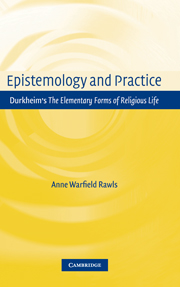Book contents
- Frontmatter
- Contents
- Acknowledgments
- Introduction
- 1 Durkheim's Outline of the Argument in the Introductory Chapter
- 2 Durkheim's Dualism: an Anti-Kantian, Anti-Rationalist Position
- 3 Sacred and Profane: the First Classification
- 4 Totemism and the Problem of Individualism
- 5 The Origin of Moral Force
- 6 The Primacy of Rites in the Origin of Causality
- 7 Imitative Rites and the Category of Causality
- 8 The Category of Causality
- 9 Logic, Language and Science
- 10 Durkheim's Conclusion Section iv: Logical Argument for Social Origin of the Categories
- Conclusion
- Bibliography
- Index
Introduction
Published online by Cambridge University Press: 22 September 2009
- Frontmatter
- Contents
- Acknowledgments
- Introduction
- 1 Durkheim's Outline of the Argument in the Introductory Chapter
- 2 Durkheim's Dualism: an Anti-Kantian, Anti-Rationalist Position
- 3 Sacred and Profane: the First Classification
- 4 Totemism and the Problem of Individualism
- 5 The Origin of Moral Force
- 6 The Primacy of Rites in the Origin of Causality
- 7 Imitative Rites and the Category of Causality
- 8 The Category of Causality
- 9 Logic, Language and Science
- 10 Durkheim's Conclusion Section iv: Logical Argument for Social Origin of the Categories
- Conclusion
- Bibliography
- Index
Summary
Emile Durkheim's Les Formes Elementaires de la Vie Religieuse: Le Systeme Totemique en Australie, published in French in 1912, the first of Durkheim's major works to be translated into English in 1915, as The Elementary Forms of the Religious Life, offers a theory of mutual intelligibility achieved through orders of practice, a position that his earlier writings on social order assumed, but did not explain, and as such is the crowning achievement of Durkheim's sociology. The book, generally treated either as a work on primitive religion, or a sociology of knowledge, and elaborately and consistently misunderstood since the beginning, constitutes, in fact, Durkheim's attempt to set his earlier works on a firm epistemological footing. This he achieves by elaborating a theory of practice, as the basis for mutual intelligibility, which would establish a unique epistemological basis for sociology and the study of moral relations.
The Elementary Forms presents a careful and thorough historical and comparative argument for the empirical origin of six basic ideas, or categories of the understanding, identified by the philosophical debate as essential to epistemological validity (time, space, classification, force, causality and totality). This argument, which treats religious practice as the foundation of social life, speaks to the current context of conflict between religion and what is generally referred to as secular culture in an era of globalization. The ascendency of the secular in the west, following the bloodbaths of the Protestant Reformation, reduced the scope of religion in public life.
- Type
- Chapter
- Information
- Epistemology and PracticeDurkheim's The Elementary Forms of Religious Life, pp. 1 - 27Publisher: Cambridge University PressPrint publication year: 2005

